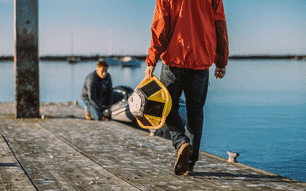For centuries, Gloucester, Massachusetts has been one of the nations top fishing ports, a port filled with commercial and recreational fishing boats, fish buyers, distributors, ice houses, shipyards, seafood restaurants, and fishermens bars. The town was built on a foundation of fish and fishing runs strongly through the citys blood. Now, NOAA is beginning to work with the fishermen of Gloucester to add mussel farming, or aquaculture, as a complement to traditional fishing.
Looking over the harbor with all of the fishing activity, one might ask why fishermen would be interested in aquaculture. To them it makes sense: farming mussels allows them to use their skills as watermen and existing boats and equipment to boost their income while continuing to work on the water.
It makes sense to the city, too. Mussel farming supports existing infrastructure, a working waterfront, and an economy that is heavily dependent on seafood.
Mussel farming in New England is a step forward for fisheries efforts in todays depressed fishing economy, said Ted Maney, visiting professor at Salem State University and proponent of mussel culture. Most commercial fishers can add mussel farming to their current efforts and enhance their livelihood.
With this in mind, NOAA Fisheries provided a $61,000 grant earlier this year to support a demonstration mussel farm in federal waters off the coast of Massachusetts. The project will engage and train local fishermen in the long-line mussel farming method, wherein mussels grow in socks along ropes suspended in the water column. Also used in New Zealand, fishermen more recently tested this method at new mussel farms in Massachusetts state waters. Currently, Salem State (the grant recipient) is working to obtain federal permits before farming can begin.
By working through the permitting process and deploying a long-line system, we hope to show that offshore mussel farming is practical and complementary to traditional fishing activities, said Dr Mark Fregeau, the project coordinator for Salem State.
The US imports 94 per cent of the mussels consumed here, of which 95 percent comes from aquaculture. Embracing off-shore mussel farming in the US has the potential to increase the domestic supply of this very popular seafood, as well as maintain the character and vibrance of the seafood town of Gloucester.
Offshore mussel farming shows great potential to increase locally-produced seafood in a sustainable way, said Dr Michael Rubino, Director of NOAA Fisheries Office of Aquaculture. Seafood farming represents a real opportunity to create jobs in communities that need them most.
NOAA Develops Mussel Aquaculture in Massachusetts
US - The National Oceanic and Atmospheric Administration (NOAA) is working with fishermen in Gloucester, Massachusetts, to develop mussel aquaculture.
by Lucy Towers




